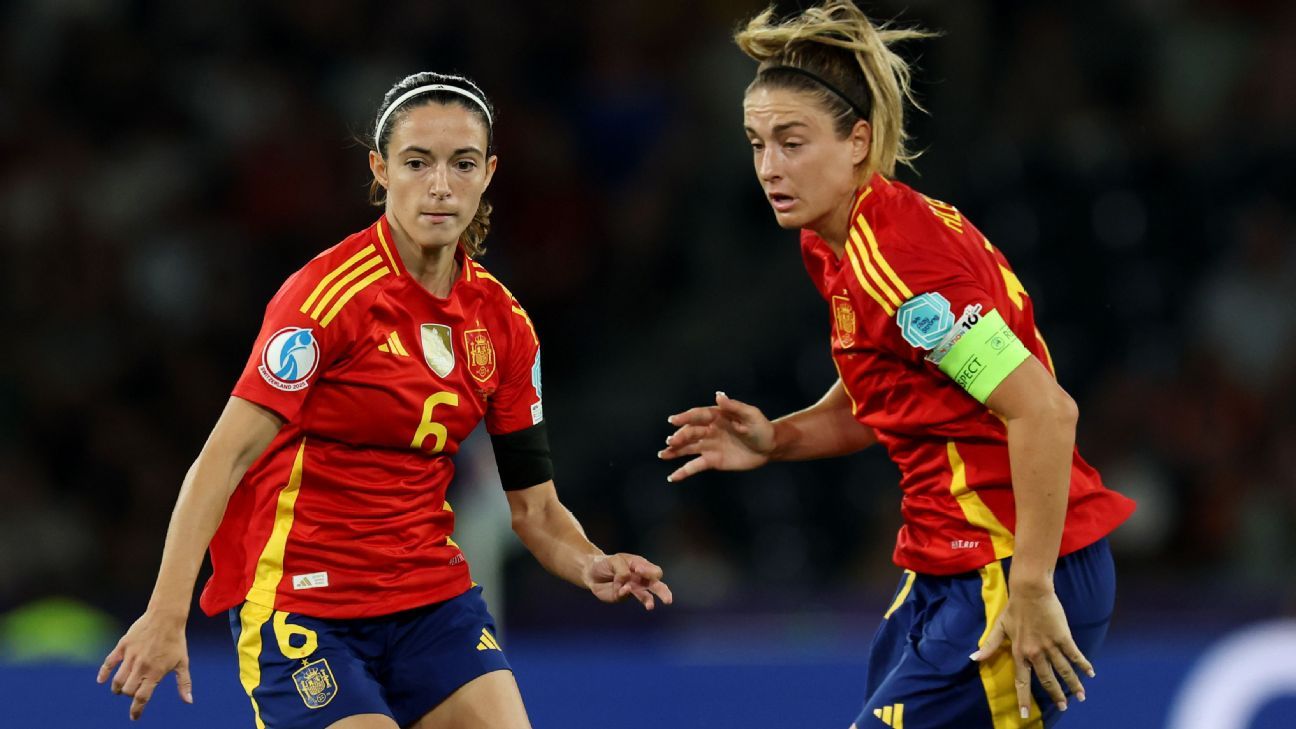Lausanne, Switzerland – Alexia Putellas, Aitana Bonmatí, and Patri Guijarro resemble a close-knit family unit in Barcelona. However, they’ve faced challenges that prevented them from teaming up for Spain as they do at the club level. The upcoming Euro 2025 could mark a turning point this summer, starting with a crucial match against Germany in Zurich, as the reigning world champions aim to secure a spot in the European Championship final for the first time ever.
The success of Spain hinges significantly on their midfield trio. Putellas, Bonmatí, and Guijarro have amassed numerous trophies together at Barça, yet surprisingly, they’ve played together in just two out of Spain’s last 21 matches across the World Cup, Euro, and Olympics.
In the 2019 World Cup, none were regular starters, and in 2022, Putellas suffered an ACL injury right before the Euro tournament. Guijarro skipped the 2023 World Cup in protest against the Spanish Football Federation’s (RFEF) working conditions. Although she returned for last year’s Olympics, she mentioned not feeling entirely comfortable as coach Montse Tomé chose this trio as midfielders in two of Spain’s six tournament matches.
– Bonmatí’s journey from battling meningitis to becoming an MVP
– Berger represents Germany as a formidable opponent in the upcoming semi-final
– Euro 2025 Semi-finals: How to tactically defeat each team?
Despite their challenges, Bonmatí bounced back from a bout of viral meningitis just days before the tournament final. She returned to start in Spain’s last two matches after initially coming off the bench in the first two group stage games. Her standout performance in the quarterfinals secured her the MVP title, with Putellas and Guijarro also earning accolades in earlier matches against Portugal and Belgium.
With Bonmatí not at full strength yet, Putellas distinguished herself by leading Spain through the group stage. After two years of injury struggles, she focused on making a remarkable comeback, feeling driven to perform well, especially after missing the final due to her ACL injury.
“If anyone holds the burden, it’s Putellas,” said Jana Fernández, a defender for Barcelona and Spain. “We’re all incredibly motivated, but after what transpired in the last Euro, Alexia is even more determined to excel.”
“Her value to the team is immense, both on and off the pitch. When she plays at her best, it elevates the whole team,” she added.
Putellas, at 31, contributed three goals and four assists throughout the group stage. Despite coming up short against Switzerland, she showcased her skill, and although some questions about her pre-injury form have emerged, her teammates have unwavering confidence in her talents.
“She brings a unique spark to the field,” said Lucia García, a Monterrey and Spanish teammate. “Her game vision is unmatched, and I am always amazed by her abilities. Playing alongside her enhances my own game.”
Putellas has created a tournament-high 18 chances, helping Spain secure 16 goals over four matches, while Bonmatí contributed five chances even after starting from the bench initially due to her illness.
Tomé initially expressed the need for more caution, but now the team is ready to assert themselves. Bonmatí acknowledges the strength of the entire squad when each player performs to the fullest.
“I am fully committed to giving my best for the team,” she told ESPN. “When we all put in our best efforts, I believe it’s our time to reach an unstoppable level of play.”
Having influential players like Bonmatí and Putellas certainly helps. Bonmatí’s creative back-heel assists against Switzerland highlighted her flair, breaking through the host nation’s defense.
Putellas and Bonmatí have shared four recent Ballon d’Or awards, each winning two. Guijarro, often less visible in the shadows of her teammates, is starting to regain her confidence after struggling upon her return to the national squad.
“Returning to the team has been challenging for her; it was a gradual process, but she’s back to her best now,” Tomé said. “In her position, she’s the best in the world. Although her role might not be fully recognized, her hard work enables those in front of her to play more freely.”
Gijarro, a key player at 27, has been essential in Spain’s attacking setup, completing 292 passes, the highest in the tournament, with a remarkable 190 in the opponent’s half.
“Playing with Patri is both simple and complex,” noted Vicki López, a Barcelona and Spanish midfielder. “Her vision often surprises, as she anticipates plays that others don’t. Her passes are rarely straightforward; she always aims to advance the game. Every decision she makes is meaningful.”
“She is undoubtedly among the world’s best players and often overlooked. She is the backbone of the team, helping to ensure peak performances from everyone,” she added.
As seen with her goal against Italy, Guijarro can deliver in the final third, but the midfield trio now faces a significant challenge. They are up against Italy, ranked 13th, which is the highest-ranked team they’ve faced so far, along with Belgium (20), Portugal (22), and Switzerland (23) being defeated as well. Germany, ranked third globally, has never lost to Spain in previous Euro encounters.
“I have immense respect for Germany,” Bonmatí stressed. “Historically, they’ve won eight European Championships, which puts the pressure on them.”
“A year ago, we faced them and left Paris without a medal after a disappointing defeat. For teams and players like us, that’s a tough pill to swallow.”
Fan Take: This match is significant not only for the players involved but also for the growth of women’s soccer. A potential victory for Spain could mark a pivotal moment in the sport, highlighting the rising competitiveness of women’s teams globally and inspiring a new generation of players.



